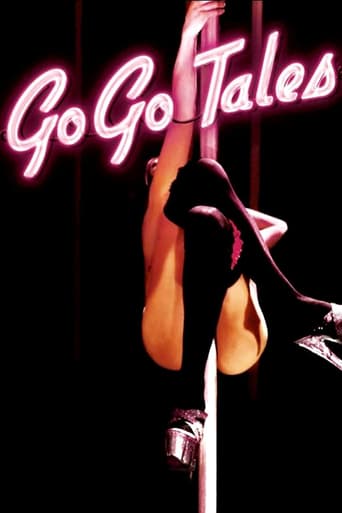

Good old Abel Ferrara, his films are never the easiest to watch and no easier to review. Always worth watching, however, and this little number had completely passed me by before I picked up an Italian DVD, with an English audio track fortunately. A failing strip/lap dance joint a lost lottery ticket and owners threatening to foreclose. Sounds a little uninspiring but the Ferrara is not interested in some glossy, happy go lucky enterprise and what we get here is a very well shot, edited and filmed impression of more behind the scenes than anything else. Most of the guys are aged, bossy and freeloading as the ship goes down while all the nubile ladies give it their all, because that's what they do. Asia Argento is very impressive, as is the ever dependable William Dafoe in the lead. Roy Dotrice was a nice surprise and even Bob Hoskins is fine. Sylvia Miles, who I haven't seen since Paul Morrissey's Heat, is a little over the top but just about does the job. More than a little echo here of Cassavetes' Killing of a Chinese Bookie, but nothing wrong with that.
... View More"Here in America, there is no difference between a man and his economic fate. A man is made by his assets, income, position and prospects. His economic mask coincides completely with his inner character. He learns what he is through the vicissitudes of his economic existence within capitalism, and knows nothing else." - Theodor Adorno "Every dollar has a certain nervousness attached to it." - Ferrara A loose remake of "The Killing of a Chinese Bookie", Abel Ferrara's "Go Go Tales" is one of the directors best, late-career works. The film was panned by Western critics and would receive virtually no theatrical distribution, but was voted into several top-ten lists by the Cahiers du Cinema crew.The plot? Willem Dafoe plays Ray Ruby, the overseer of the Paradise Lounge, an up-market strip club which is slowly going broke. Profits are meagre, business is slow and Ruby's girls are all desperate for cash. To make matters worse, Ruby's brother (Mathew Modine), the supplier of Ruby's finances, is threatening to pull the plug on the club. Things look bad for the Paradise.In an effort to bring in revenue, Ray embarks on a series of elaborate schemes ("Frisbees with my face on them! What was I thinking?"). He ferries in Japanese businessmen, serves gourmet hot-dogs, renovates lounges and hosts Talent Show Nights, though to no avail. His business is going under. In a last ditch effort to save the Paradise, Ruby thus concocts a brilliant scheme. He'll rig the lottery and win 18 million! The plan works, but Ray can't find the winning ticket. Poor guy.Like most of Ferrara's later works, "Go Go Tales" is obsessed with money. Capitalism as gaudy flesh-market, Ferrara has every conversation in the film hinge on economics. And unlike most stripper movies, which centre on female exploitation, Ferrara broadens things. Every character, be they feisty landlord (a brilliant Sylvia Miles), upper management, financier, worker or dancer, spews an incessant stream of dialogue relating to payments, profits and back-pay. They're all struggling to make ends meet. In fits of desperation, they're also all forced to diversify in various different ways. And so strippers fight to sell movie scripts (the title of which is a symbolic allusion to "Gun for Jennifer"), wives dance to bring in cash (despite being married to doctors!), landladies sell real-estate to cover their losses, and millionaires likewise. In the middle of this hurricane is Rudy, part huckster, part caring patriarch, part loser, part shrewd capitalist, part charismatic impresario, part mean overlord. Stuck in a world in transition, he yearns for a simpler, sleazier time (he fantasises about "clean" ballet dancers, rather than strippers) in which people weren't part something but seemingly whole instead; a time before quaint sleaziness was hijacked by corporate sleaze. Meanwhile, the silly crab mascots of a rival business across the street steal Ruby's clients. Is nothing sacred?! "Go Go Tales" is full of melancholy, but it's a melancholy which Ferrara knows well. He began his career making pornographic and/or exploitation flicks, and even a film which chronicled the early, Times Square strip club culture in its pre-Giuliani heydays. Times change, though, and Ruby finds himself, not only struggling to stay afloat, but forced – just like Ferrara, who begs Europe for funding - to both cheat the system and play by madcap rules in order to survive. The film ends with Ruby finding his ticket, collecting his jackpot and then grimacing when he learns that over half his winnings will be lost to taxes.Expertly, "Go Go Tales" captures the agony and banality of human relations under capitalist regimes. Here, everyone seems indebted at birth, innovation and/or improvisation is never enough, counterfeit bills circulate to keep the system's illusions afloat, the cage's walls are riddled with hopeful but mostly defunct lottery tickets, the profit motive invades all human relations, money rules without obstruction and people operate at break-neck speeds, bodies go-going after money which itself seems to constantly flutter away.In Ruby's world, everyone thinks in terms of and exists only for cash. But whilst every character circulates in order to bring alive the system's real and fake bills, Ray provides a different function. He's the magician who provides the illusion of plenitude, of Paradise, the illusion that money, real and virtual, can usefully circulate.Incidentally, Cassavetes' "Chinese Bookie" dealt with a guy attempting to create a viable Utopia within the world of Mafia business. There the lead character sets up The Crazy Horse West, a club where human relations can hopefully become beautiful, familial and exist outside of Mafia logic. Ruby's Paradise was built to fulfil a similar function. The Paradise embodies the possibility that one can still create something wholesome within capitalism, both clubs designed to house experimental troupes which allow us to conceptualise different relations, communities, modes of interaction, performances and shared history. The experiment fails, of course. Despite his attempts to be a "good daddy", to host clean Talent Shows, to put on tasteful vaudeville routines, the Paradise is destined to be tainted by the sheer physics of money. The wife who dances for her husband, he her customer with both not even realising it, epitomizes this "corrupting" of human relations. Prostitution has become the norm, and the singular, spectacular event (the lights, the stage etc) has been replaced by something else entirely (literally a cosmetics boutique, an apt summary of Manhattan's transformation).Relaxed, gentle and unforced, the film's style is pure Altman, with a strong vein of Assayas. As is typical of Ferrara, the film is sexy, but interested more in the cash affixed to G-strings than naked flesh itself. Bob Hoskins co-stars as an irate henchman.8.5/10 - Worth two viewings.
... View MoreShot in November 2006, Abel Ferrara's Go Go tales isn't the comedy he was selling us, that honour goes to Driller Killer with his artist in turmoil overacting. This film is nowhere near the screwball comedy a Director with 30 years experience under his belt would spit out. Did Ferrara think the punchline joke that ends the film was worth sitting through 1 hr and 40 mins? No. His lacking script or should I say the editing room helped dig this film further into distribution hell, as of 2009 the film has hardly been seen, DVD's cannot be easily sought, no screenings anywhere unless you download the film for free. I for one would buy the DVD, not for the film, but to listen to Ferrara's hilarious commentary which is always good for a laugh! Poor Italian investors, unlucky crew and especially embarrassment for the cast.Many actors are wasted with nothing to do, as I blame the editing which Ferrara loves to shoot everything on set and then try to stitch it all up coherently later, which he did brilliantly with SNAKE EYES (Dangerous game) and partly successfully in NEW ROSE HOTEL and failed miserably in THE BLACKOUT.Hamming it up seems to be another problem with Go go tales. Sylvia Miles maybe an icon from the 60's Warhol set but her acting hasn't IMPROVed either. Asia Argento may be pretty but she is as bad as Sylvia Miles with the improv and she wasn't even born when Warhol put down his Bolex and switched to Polaroid. Credit to Matthew Modine for making a third appearance in a Ferrara film, an actor whose career has drifted off slightly since starring in his first Ferrara film THE BLACKOUT in 1997. Special mention to Willem Dafoe who actually pulled what he had out of the bag to give us that smirk in the final shot of the film.Years of pre-production hell. Distribution legal troubles and an ever changing cast made this film a trouble project for Ferrara. Then again he was the writer and director of this tale and unfortunately not one for recommendation.
... View MoreI do not remember for a long time seeing such a bad film. The story itself might not have been very bad for a quirky comedy, however, nothing in this movie is done anywhere near well. The dialogs are God awful, not funny and hardly understandable. The girls do not even know how to move or dance, so there was no visual pleasure either. It was hectic, very plain, extremely predictable and as I said the whole idea of doing something for the soul and being one big nice warm family within the simple strip club, would not have been so bad had it been done tastefully with humor, the real one, not the one that is based on curse words alone. In short it was boring, badly developed, not funny at all, did not make much sense until the very end, where the viewer sort of understands what was going on, who are those people and how they related to each other and that sort of things. I know that I have said here that it was predictable and at the same time did not make much sense,I fully understand that this is controversial; however that exactly how it was - partly this partly that - imagine!
... View More